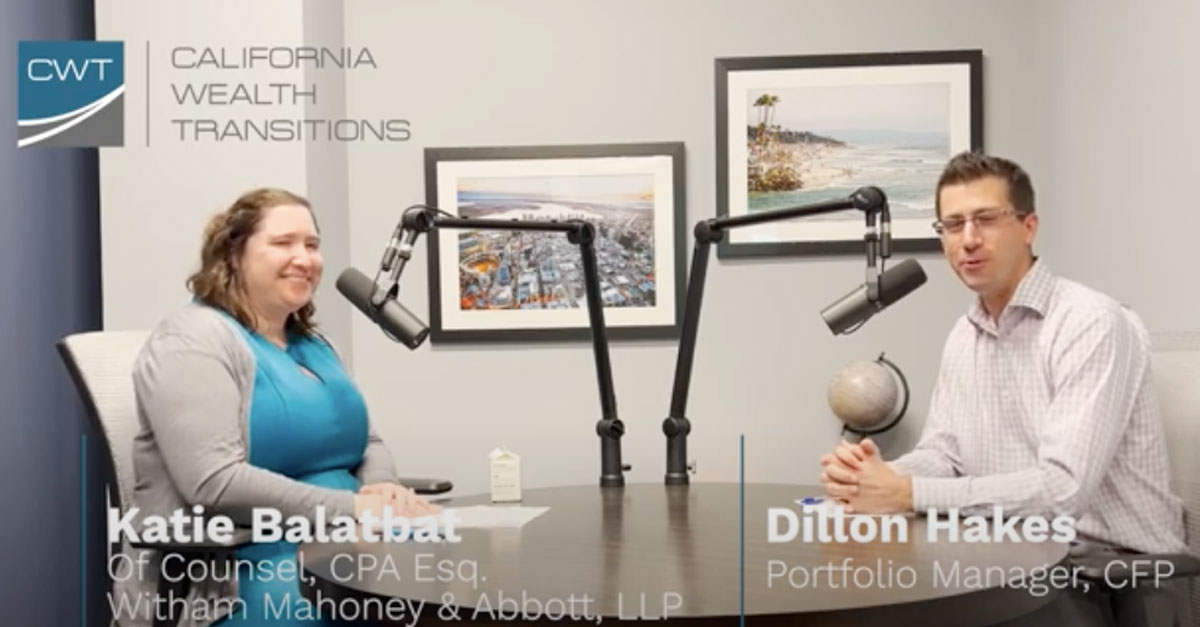This session of Planning with Purpose features Dillon Hakes speaking with Katie Balatbat, Esq and CPA at Witham, Mahoney & Abbott, LLP about key considerations when doing estate planning.
Continue readingSecure Act 2.0 | Special Needs Trusts
The SECURE Act was hailed as the most substantial retirement legislation passed in over a decade. It contained important changes to Individual Retirement Accounts (IRAs) and other qualified accounts intended to help investors save more and be better prepared for the future.1
The passage of the SECURE Act in 2019 added complexity to how these types of trusts could be set up, resulting in limitations on their usefulness as long-term financial solutions. The SECURE 2.0 Act included a modification to help rectify this situation.
Charities are now allowed to be remaindermen of a Special Needs Trust.
SECURE 2.0 resolves an issue with the SECURE Act and clarifies that, in the case of a special needs trust established for a beneficiary with a disability, the trust may provide for a charitable organization as the remaining beneficiary without triggering the truncated payout period. This change provides a welcome, though limited, enhancement to special needs trusts designed to receive retirement benefits and qualify as see-through trusts under the SECURE Act provision for applicable multi-beneficiary trusts (AMBTs).2,3
While this provision allows most charities to be named as remainder beneficiaries after the death of a disabled or chronically ill beneficiary—without disqualifying that initial disabled beneficiary from stretching the IRA over their lifetime—grantors must be careful to avoid naming disqualified charities such as private foundations as the remainder beneficiary.3
Special Needs Trusts4
A special needs trust is a legal arrangement that allows a disabled or chronically ill person to receive income without reducing their eligibility for the public assistance disability benefits provided by Social Security, Supplemental Security Income, or Medicaid.
A grantor, such as a parent or guardian, creates a special needs trust and appoints a trustee to oversee the disbursement of assets from the trust to the disabled beneficiary. The trust is designed to supplement the beneficiary’s government benefits but not replace them.
A special needs trust is one strategy for those who want to help someone in need. The trust seeks to manage the risk that the person will lose their eligibility for government programs that require income or assets to remain below a certain limit.5
Many grantors will set up a special needs trust that names a charity as the remaining beneficiary in the event the original beneficiary dies before the funds are depleted. SECURE 2.0 now allows that practice to continue.
It’s important to remember that using a trust involves a complex set of tax rules and regulations. So, we believe it’s critical to work with professionals familiar with the emerging rules and regulations.
We can help.
People caring for others with disabilities must pay attention to a wide range of considerations so it’s easy to understand if changes in government regulations or tax programs get overlooked.
As financial professionals, we have resources that highlight new rules and regulations so we can help our clients take advantage of emerging opportunities. If you are interested in learning more, please let us know. We are happy to explore whether this new legislation might benefit or complement some of the preparations you have already made for a family member with a disability.
Tax Strategies for Widows | What to Do When Your Spouse Dies
Widows often face a significant drop in income after the loss of their spouse, and the IRS offers a few important tax breaks that can help mitigate the loss and improve financial stability moving forward.
Continue readingTop 3 Financial Considerations for Women Inheriting Wealth
Whether you are facing the challenge of how to best manage a recent or upcoming inheritance or planning for the transfer of your wealth to the next generation, we are here to help. Allow our team of legacy planning experts to help you put together a plan today to protect those you love now and in the future.
Continue readingWhat to Do When Your Spouse Dies: Top Financial Moves for Women
Losing a spouse or partner is devastating, and it can be overwhelming trying to make decisions about finances while grieving. Here are some important financial moves you should consider after your spouse dies.
Continue readingProtecting and Transferring Your Family’s Wealth: Don’t Wait to Plan!
Having children is one of life’s greatest joys. Planning for their future and protecting them starts the day they are born. As life moves forward, your concerns may shift to their financial wellbeing as adults and keeping the wealth you have built within the family. This is one financial step you don’t want to overlook. Be intentional and vocal about your wishes, and work with a financial expert to ensure your wealth is maximized and protected! It’s never too early to start thinking about a successful transfer of your wealth to the next generation.
Setting your children and grandchildren up for success really involves two initiatives: one is protecting your family wealth and creating a tax-efficient plan for its successful transfer, but there’s a second piece many families forget to think about. Part two is ensuring your children are adequately prepared to manage their inheritance according to your wishes.
One other thing to remember is that family wealth is not simply bank accounts and investments. There may be long-held pieces of valuable property, and family treasures like jewelry or other priceless heirlooms. All of these pieces should be considered when working on your wealth preservation plan and your estate plan.
Goals of Estate Planning
Every family is different. You will need a customized estate planning strategy that takes into account your specific situation, your heirs, and your assets. This is particularly true if you’re a business owner. Overall, there are three broad goals of an estate plan:
- Protect Your Wealth from Taxes
Who wants to pay more than they have to? This goal goes beyond income taxes to taxes on any charitable gifts (see below), estate taxes, and generation-skipping taxes. With an expert, you can minimize your tax obligation and strategize accordingly. - Avoid the Probate of Your Estate
This is a slow, costly, very public process that can result in holding up the distribution of your wealth and even worse, yielding a portion of the estate to the court in fees. Probate can be avoided with a proper trust structure and communication. - Safeguard Wealth from Legal Issues
Again, this goal is tied to the structure of any trust selected to secure your estate. You want to shield your assets from potential lawsuits and creditors, especially if you are in a profession prone to more risk (doctors, etc.).
A skilled financial advisor partnered with an attorney can work together to put together an estate plan designed to meet your needs.
There are hundreds of complex estate planning strategies but these are just a few your team may explore:
- Annual Gifting
Charitable gifts can help to reduce the amount of your taxable wealth and increase opportunity for significant tax advantages. Gifts may be given directly to individuals or in a trust. You can maintain control over assets if a designated charity is a family foundation or other such entity. Gift your money to your heirs while you’re still alive in the amount of up to $14,000 per year, to avoid tax liability. - Update Beneficiaries
Not all assets are distributed via a will. Your retirement accounts and insurance policies must be updated with current beneficiaries if you want to avoid these accounts going to probate! Many people don’t know that most states allow beneficiaries to be named for bank accounts as well. Any life event will necessitate updating your designated beneficiaries. - Check into Laws about Homesteads
Each state has different regulation regarding homesteads, annuities, and life insurance. These are potential vehicles that can protect cash. An expert will know which assets are protected by your individual state and can advise you on placing funds in sheltered vehicles. - Consider Asset Ownership
Keeping assets in your own name leaves them susceptible to risk from creditors and lawsuits. Placing your assets under the ownership of a trust or an LLC (if you have investment properties or rental properties) can be an effective protection strategy. As long as assets are in a trust, they belong to the trust and not to you, but you do maintain control by placing stipulations and managing it through an appointed trustee.
Talk to Your Family About Your Plans
Key Takeaways to Remember in Planning for Transfer of Wealth
- Keep your specific goals in mind, and share them with your financial advisor and estate planning attorney. Do you want to leave an inheritance for your children? Keep a piece of property in the family? Pay for your grandchildren’s college tuition? Communicate your intentions and help your team build a plan to accomplish your goals.
- Review your plan as your circumstances change. Every life transition – a death, job change, divorce, or birth – warrants a second look at your estate plan! Consider setting a date each year to make sure your affairs are in order.
- Talk to your family. Tell your children and grandchildren why protecting your wealth is important to you, and ask them to be responsible stewards of the legacy you are leaving.
- Be sure to consider and plan for your own healthcare, living expenses and philanthropic efforts. It’s also a good idea to let your loved ones know your wishes should you become ill or unable to make decisions for yourself.
If you need assistance with planning for the transfer of your wealth to the next generation, give us a call at California Wealth Transitions.







